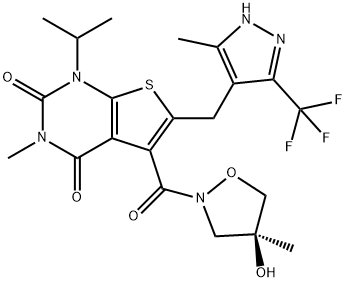AZD3965 is a potent, selective and orally available monocarboxylate transporter 1 (MCT1) inhibitor with a binding affinity of 1.6 nM, 6-fold selective over MCT2.
In nonobese diabetic scid-γ mice bearing COR-L103 xenografts, AZD3965 (100 mg/kg, p.o.) reduces tumor growth and increased intratumor lactate. In mice bearing H526 tumors, AZD3965 (100 mg/kg, p.o.) causes increased lactate concentration, a reduction in growth and increased radiation sensitivity.
In lymphoma cell lines that preferentially express MCT1, AZD3965 potently inhibits lactate transport and cell growth. AZD3965 inhibits MCT1 activity in cells, and shows higher sensitivity in hypoxia. In H526, HGC27 cells and DMS114 cells, AZD3965 increases intracellular lactate and significantly reduces lactate uptake.
AZD 3965 is a potent inhibitor of monocarboxylate transporter 1 (MCT1; Ki = 1.6 nM), killing tumor cells that are reliant on glycolysis by blocking lactate transport. It displays six-fold selectivity for MCT1 over MCT2 and is without effect against MCT4 at 10 μM. AZD 3965 increases intratumor lactate levels and decreases tumor growth in mice bearing COR-L103 small cell lung cancer (SCLC) xenografts. AZD 3965 also enhances radiosensitivity in mice with SCLC xenografts.
AZD 3965 is a monocarboxylate transporter 1 (MCT1) inhibitor.
previous study found that the in-vitro azd3965 sensitivity varied and was highest in hypoxia. to further support that azd3965 targeted mct1, ncih1048 cells were engineered to inducibly overexpress mct1. it was found that when mct1 was overexpressed, the ec50 of azd 3965 against nci-h1048 was increased from 0.14 to 10.5 nm, which was consistent with azd3965 acting through mct1 inhibition [1].
cor-l103 xenograft studies were conducted to test whether the in-vitro effect of azd3965 could be recapitulated in vivo. cor-l103 tumor-bearing mice were treated with azd3965 at 100 mg/kg bid for 21 days. the pharmacokinetic analyses showed that azd3965 at 100 mg/kg bid led to free concentrations of azd3965 predicted to inhibit lactate transport. moreover, azd3965 treatment was able to reduce the growth of corl103 tumors significantly, though tumor regression was not observed, which was consistent with azd3965 only targeting the hypoxic fraction of the tumor [1].
This orally bioavailable MCT1 inhibitor (FW = 515.51 g/mol; CASs =
733809-45-5 and 1448671-31-5), also named (S) -5- (4-hydroxy-4-
methylisoxazolidine-2-carbonyl) -1-isopropyl-3-methyl-6- ( (3-methyl-5- (tri-
fluoromethyl) -1H-pyrazol-4-yl) methyl) -thieno[2,3-d]pyrimidine-2,4 (1H,
3H) -dione, selectively targets the Monocarboxylate Transporter-1 (IC50 =
1.6 nM) and is ~6x less active toward MCT2. AZD3965 does not inhibit
MCT4, even at 10 μM. MCT1 and MCT4 are primarily involved in lactate
transport, targeting highly glycolytic cancer cells, especially those that are
hypoxic. The latter property suggests that the combined use with a
vascular-disrupting anticancer agent (such as combrestatin) may improve
the inhibitory action of AZD-3965 against cancer cells.
[1] polanski, r. ,hodgkinson, c.l.,fusi, a., et al. activity of the monocarboxylate transporter 1 inhibitor azd3965 in small cell lung cancer. clin.cancer.res 20(4), (2014).
[2] https://clinicaltrials. gov/ct2/show/nct01791595 term=azd+3965&rank=1

![5-{[(4S)-4-Hydroxy-4-methyl-1,2-oxazolidin-2-yl]carbonyl}-1-isopropyl-3-methyl-6-{[5-methyl-3-(trifluoromethyl)-1H-pyrazol-4-yl]methyl}thieno[2,3-d]pyrimidine-2,4(1H,3H)-dione pictures](https://img.chemicalbook.com/ProductImageEN/2020-1/Small/d18f9122-cb5f-4c28-b842-cfdc5c88dfe7.png)